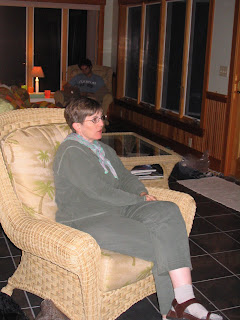It’s common knowledge that many librarians enter the field later in life in a second or third career, so I’m sure I’m not the first to suffer from the label “librarian by default”. Viewing myself as an accidental librarian, however, is not gratifying. L554 has helped me evolve psychologically and professionally towards claiming my new identity as librarian - not just librarian, but 21st-century librarian, which implies technological competence. I know I’m not great at that, but I’m good enough, and, most important, I know how and who to ask for help.
I revised my resume today. That’s a cathartic exercise. I have lived many lives. What blessings are life and health! I revisited 20+ years’ teaching at all levels, 5 years’ work in libraries and museums, the last 2.5 years’ coursework, and my spring research paper. The conclusion?—I am ready for a career in library science at many levels!
While conducting this self review, I came upon and started to read a book which so intrigued me last spring that I bought it but then never found the time to read it. It’s called The Accidental Systems Librarian (thus, the inspiration for this post’s header), by Rachel Singer Gordon. I have learned much in L554, but one thing is certain – I do not yet have the skills to be a systems librarian. What the book pointed out, though, is that for many, including the author (and Mary Alice, I believe), traditional library skills played a more important role in becoming a successful systems librarian than computer skills. Gordon points out that many accidental systems librarians came to that role via their acquisition and application of traditional library skills within an increasingly technological era. Reading this prompted a “eureka!” moment for me, because I have just entered the library field; I am acquiring traditional library skills, so why am I beating myself up for feeling altogether ignorant? I am learning a lot in a short time, and much of it is theoretical. L554 appeals to me because it pairs theory and application; it kills two birds with one stone. I can learn about technology in class and apply it to benefit a real library, which is an efficient way for me to learn, as I don’t have time to mosey. Gordon tracks the root of “traditional library skills” to one’s desire to solve problems. This, too, is heartening since I decided to become a librarian because I want to solve problems through literacy.
Compared to L554 peers’ technological prowess, mine looks pretty dinky, but my technological learning curve these past two years, honestly, resembles the 1964 Moscow obelisk commemorating the conquest of space. For me, the journey has felt a lot like traveling through space, where holding things I can feel, like a book or a baby, or producing sounds I can hear, like a song or foreign language, do not apply. I know now that learning to use technology is a lot about following directions patiently and persistently. It is a lot like swimming – if I don’t believe that I can float, then, I will be tense and sink. Technologically, I have learned to do more than tread water – I am swimming. And when it’s not fast enough or far enough, I ask for help. I won’t get sucked into a big black hole because I won’t let myself get isolated and drift helplessly away.
Mary Alice and L554 group work have convinced me that communication and people skills are critically important for 21st century librarianship. I have those skills, and they are well-developed. If, technologically, I am the turtle, not the hare, that's okay -- steady I will go. I will follow directions, and when in need, I will turn to books such as Gordon’s and/or kind colleagues for advice and information about using technology effectively. And I will give thanks for colleagues with good people and computer skills.
Subscribe to:
Post Comments (Atom)

1 comment:
Up until this semester, the Gordon book was one of two texts that I used for this class. When I updated it I went with something more current. Succeeding with technology means getting used to floundering and feeling inadequate regardless of one's technological prowess. My sense, Sue, is that the skills you bring will come in handiest with the training materials and usability testing assignments. This is where you can help repay classmates you feel have helped you. Sometimes in creating materials people who are more comfortable with technology make assumptions and omit critical pieces of information. I think your eyes will help avoid that situation.
Post a Comment